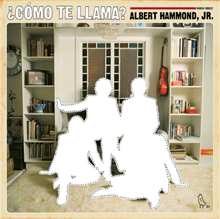
When the extended vacation taken by his regular band left him feeling restless, Strokes rhythm guitarist Albert Hammond decided to go solo. His debut, last year’s Yours To Keep, was a refreshing and superb collection of breezy, idyllic pop, free of all the self-consciousness that had plagued the Strokes’ last two albums.
Hammond has never seemed bothered that the spotlight usually fixes on bandmate Julian Casablancas, and his decision to become a solo artist has never felt like an attention grab. The songs on Yours To Keep were casual and unpretentious, as if written by accident — the Strokes re-imagined as West Coast beach bums instead of East Coast bohemians. Little more than a year has passed since that record was released, but Hammond is already back with ¿Cómo Te Llama?, an album that attempts to increase the depth of emotion without losing the laid-back vibe.
Opening track “Bargain Of A Century†adds Coldplay-style piano to Hammond’s signature guitar work, and his slurred-through-a-megaphone vocals feel simultaneously intimate and aloof. The album picks up steam with “In My Roomâ€, whose home run of a chorus would have fit in perfectly on Yours To Keep. But whereas that album kept the pace brisk from start to finish, the next track, “Lisaâ€, finds Hammond applying the brakes, trading early momentum for some strings and a touch of bombast.
This type of stop-and-go continues throughout the album. As soon as “GfC†and the excellent “The Boss Americana†energize the album, Hammond cools things down with “Rocket†and “Victory At Montereyâ€. By the time the bleary-eyed “You Won’t Be Fooled By This†comes around, ¿Cómo Te Llama? starts to run dangerously low on energy. This somnambulism is exacerbated by album-killer “Spooky Couchâ€, a repetitive, seven-minute instrumental that attempts to evoke the tone of Santo and Johnny’s “Sleepwalkerâ€, but succeeds only in being a literal manifestation of that song’s title.
Hammond attempts to defibrillate the listener with “Borrowed Timeâ€, but the jolt isn’t strong enough to cure the hangover left by “Spooky Couch.” The jaunty surf-rocker “G Up†fares much better, and “Miss Myrtle†contains enough ska-fueled buoyancy to keep the listener nodding along instead of nodding off. Final song “Feed Me Jack or: How I Learned To Stop Worrying And Love Peter Sellers†is a nice finish, though it doesn’t compare to the inventive brilliance of Yours To Keep‘s jazzy closer “It’s Hard To Live In The Cityâ€.
¿Cómo Te Llama? feels more ambitious than its predecessor, but that ambition doesn’t do the album many favors. Hammond is at his best when he is crafting off-the-cuff pop gems, and this record runs dangerously short on them. The album could have easily shed a few of its weaker tracks, and the result might not have felt so overlong or inconsistent. Hammond has proven himself a gifted songwriter and charismatic musician, but he needs to edit himself more rigorously or risk alienating his audience. Hopefully he’ll have time to put out another album before the Strokes wake up and grab the spotlight.